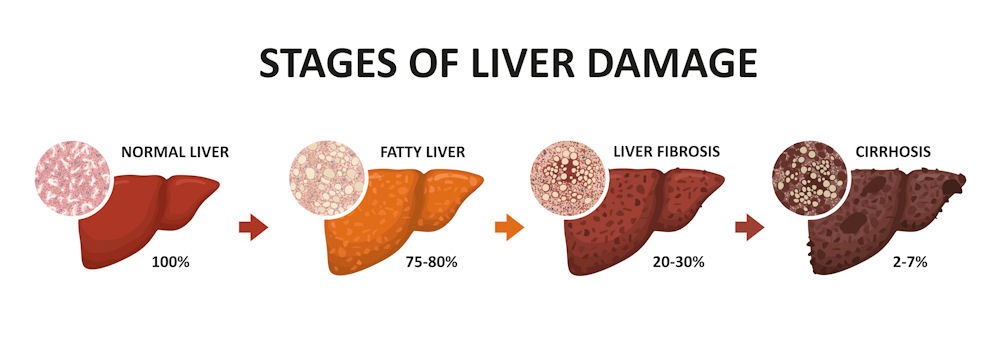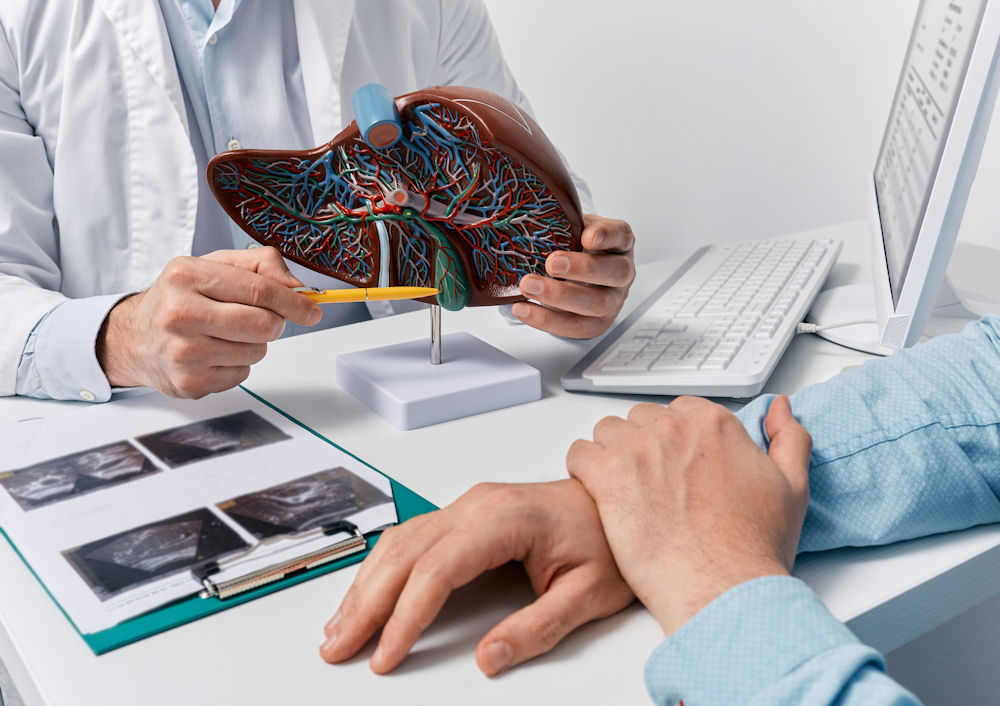Have you ever wondered if alcohol is harming your liver? Many people don’t realize the damage until serious symptoms appear. Your liver works hard to keep you healthy, but too much alcohol can weaken it over time. Early warning signs may seem small, but catching them early can prevent serious health problems.
Liver damage from alcohol doesn’t happen overnight—it builds up slowly, often without obvious symptoms. That’s why understanding the early signs is so important. At Laguna Shores Recovery in Dana Point, California, we provide compassionate support to help you break free from alcohol addiction. Our expert team offers personalized treatment to heal your body and mind.
Understanding Liver Damage from Alcohol

Your liver plays a vital role in keeping your body healthy and functioning properly. It helps process food, remove toxins, and keep you healthy. When you consume alcohol, your liver works extra hard to process and remove it. But too much alcohol over time can overwhelm your liver, leading to damage. This damage often starts slowly, and many people don’t notice it right away. The liver can repair itself, but repeated alcohol use makes recovery harder. If drinking continues, scar tissue forms, leading to permanent damage and serious health risks like liver failure.
What Does the Liver Do in the Body?
The liver has over 500 vital functions that keep your body running smoothly. It helps clear toxins, supports digestion, and stores essential nutrients for energy. It also plays a key role in fighting infections and maintaining overall balance in the body. The liver produces bile, which helps break down fats and absorb nutrients. It also regulates blood sugar and cholesterol levels to support overall health.
However, when alcohol use becomes excessive, the liver struggles to perform these tasks properly. If you stop drinking, your liver may start to repair itself. Many people wonder about the signs your liver is healing from alcohol, which can indicate recovery is happening. However, long-term alcohol damage may limit how much the liver can heal.
How Does Alcohol Affect the Liver?
Excessive alcohol use can weaken the liver and stop it from working properly. The liver breaks down alcohol, but too much can cause inflammation and scarring. Over time, this leads to Alcohol-Related Liver Disease (ARLD), which includes fatty liver, hepatitis, and cirrhosis. In the early stages, Alcoholic Fatty Liver Disease (AFLD) causes fat buildup in liver cells. AFLD is reversible if you stop drinking, but continued alcohol use can lead to more severe conditions.
Alcoholic Hepatitis causes liver inflammation, leading to pain, nausea, and jaundice. In the worst cases, cirrhosis causes permanent scarring, making it impossible for the liver to function properly. Without professional help in the form of addiction treatment programs, liver damage can become life-threatening, increasing the risk of liver failure or cancer.
Signs That Your Liver is Healing From Alcohol
The liver has an amazing ability to heal itself if alcohol use stops in time. When you stop drinking, your liver begins to repair damaged cells and restore its normal functions. However, the extent of healing depends on how much damage has already occurred. If the damage is too severe, such as in advanced cirrhosis, the liver may not fully recover. These are key signs that your liver is healing from alcohol abuse:

- Increased Energy Levels: The liver helps remove toxins from the blood. As it heals, your body functions more efficiently, and fatigue decreases.
- Better Digestion: A healthy liver produces bile, which helps break down fats. Healing improves digestion and reduces bloating or discomfort.
- Clearer Skin: When the liver struggles, toxins build up, leading to skin problems. As healing occurs, skin may look brighter and healthier.
- Reduced Swelling: Alcohol damages the liver’s ability to balance fluids. Healing can reduce bloating and swelling in the legs, feet, and abdomen.
- Improved Appetite: Liver damage can cause nausea and loss of appetite. As the liver heals, digestion improves, and appetite returns.
- Normalizing Liver Enzymes: Blood tests often show high liver enzyme levels due to alcohol damage. A healing liver brings these levels back to normal.
Healing Your Liver After Alcohol Abuse
Stopping alcohol use is the most important step in allowing your liver to heal. Your liver can begin repairing itself within days, but full recovery takes time. Proper nutrition and lifestyle changes can help speed up the healing process. If severe damage has occurred, medical support may be needed to manage long-term liver health.
Ways to support liver healing:
- Eat a Nutrient-Rich Diet: Focus on whole foods, including fruits, vegetables, lean proteins, and whole grains, to give your liver the nutrients it needs.
- Stay Hydrated: Drinking enough water helps flush toxins and supports liver function. Try to drink at least eight glasses of water daily to stay hydrated.
- Get Enough Vitamins: Vitamins like B-complex, C, and E, along with minerals like zinc, support liver cell regeneration and reduce inflammation.
- Limit Processed Foods and Sugar: Processed foods and excess sugar can increase liver stress. Choose natural, unprocessed foods to help recovery.
- Exercise Regularly: Physical activity improves blood flow and helps your liver process fats more efficiently, reducing strain on the organ.
- Avoid Other Toxins: Smoking, drugs, and even excessive medications can add stress to your liver. Reducing these helps your liver heal faster.
- Consult a Doctor: Regular check-ups can monitor liver health and provide guidance on recovery, especially if damage is severe.
With the right care, your liver can heal and regain its function, improving your overall health and well-being.
How Long Does It Take for Your Liver to Heal from Alcohol Abuse?
The liver starts to heal itself as soon as you stop drinking. In mild cases, recovery can begin within a few days to weeks. If the damage is more severe, full healing may take several months or even years. However, if cirrhosis has developed, some damage may be permanent, and medical care is needed to manage liver health. The speed of recovery depends on factors like how long and how much you drank, your overall health, and your diet. With proper care, many people see improvements in liver function and overall well-being.
Liver healing happens in stages. In the first few days, inflammation may decrease as alcohol leaves your system. Within a few weeks, fat buildup in the liver may start to reverse. After several months, liver function can improve significantly if no further alcohol is consumed. For those with severe damage, lifestyle changes and medical support are essential for long-term health.

Treatment for Alcohol Addiction
Quitting alcohol is not easy, but treatment can help you regain control of your health. Professional support provides medical care, therapy, and lifestyle changes to promote long-term recovery. The right treatment plan helps the liver heal while addressing the root causes of addiction. If alcohol dependence is severe, medical supervision is crucial for a safe and effective detox.
The first step is removing alcohol from your body. A medically supervised detox helps manage withdrawal symptoms and protects your health. Withdrawal symptoms can range from mild nausea to severe complications like seizures, so medical support is important.
Doctors may check liver enzyme levels and provide medications if needed to support liver healing and prevent complications. Blood tests help track liver recovery and identify any lasting damage.
Behavioral therapy helps address emotional triggers and builds coping skills to prevent relapse. Group therapy offers support from others in recovery. Therapy also helps treat underlying mental health conditions like depression and anxiety, which often contribute to addiction.
A balanced diet with vitamins, minerals, and hydration helps the liver regenerate and improves overall health. Foods rich in antioxidants, such as berries, nuts, and leafy greens, can help reduce liver inflammation.
Exercise, stress management, and good sleep support both mental and physical recovery. Avoiding toxins like processed foods and tobacco also helps. Regular exercise helps improve liver function and overall well-being.
Recovery doesn’t end after detox. Addiction counseling, support groups, and sober living programs help maintain long-term sobriety. Support from family and friends also plays a key role in lasting recovery.
Heal At Laguna Shores Recovery

At Laguna Shores Recovery, we understand how hard it is to break free from alcohol addiction. Our compassionate team provides personalized treatment to support both your recovery and your liver’s healing. We offer a safe, medically supervised detox, therapy, nutrition guidance, and long-term support. With our help, you can rebuild your health and regain control of your life.
Our team creates customized treatment plans based on your unique needs. We provide 24/7 medical support during detox to ensure your safety and comfort. Our holistic approach includes therapy, healthy nutrition, and wellness programs to help your body heal naturally.
If you’re wondering about the signs your liver is healing from alcohol, we’re here to guide you every step of the way. Contact us today to start your journey to healing. You are not alone—we are ready to help you take the first step toward a healthier future.

 Matthew Beck B.A, M.A, LMFT
Matthew Beck B.A, M.A, LMFT 


